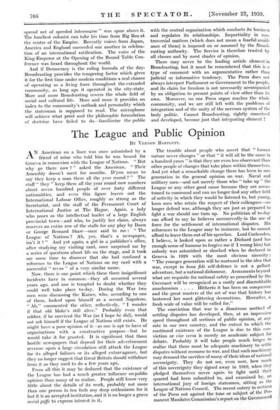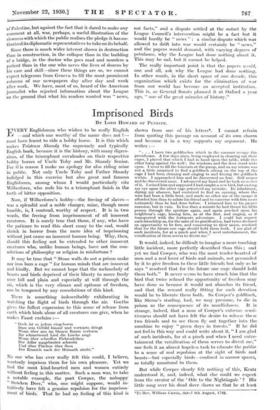The League and Public Opinion
BY VERNON BARTLETT.
AN American on a liner was once astonished by a friend of mine who told him he was bound for Geneva in connexion with the League of Nations. " But why go there now ? " asked the American. " Their Assembly doesn't meet for months. D'you mean to say they keep a man there all the year round ? " The staff " they " keep there all the year round now numbers about seven hundred people of over forty different nationalities, and even this figure leaves out the International Labour Office, roughly as strong as the Secretariat, and the staff of the Permanent Court of International Justice at The Hague. Again, a lady who poses as the intellectual leader of a large English provincial town—and who, to justify her claim, always reserves an entire row of the stalls for any play by Ibsen or George Bernard Shaw—once said to me : " The League of Nations ? Ah, yes, that's a newspaper, isn't it ? " And yet again, a girl in a publisher's office, after studying my visiting card, once surprised me by a series of questions about life on the stage, and it took me some time to discover that she had confused a reference to the League of Nations on my card with a successful " revue " of a very similar name.
Now, there is one point which these three insignificant incidents have in common—they all occurred several years ago, and one is tempted to doubt whether they could well take place to-day. During the War two men were discussing the Kaiser, who, according to one of them, looked upon himself as a second Napoleon. " Ah," commented the other, reflectively, " I wonder if that old bloke's still alive." Probably even that soldier, if he survived the War (as I hope he did), would not ask himself if the League of Nations still exists. He might have a poor opinion of it—as one is apt to have of organizations with a constructive purpose—but he would take it for granted. It is significant that those hostile newspapers that depend for their advertisement revenue upon a large circulation still attack the League for its alleged failures or its alleged extravagance, but they no longer suggest that Great Britain should withdraw from it as they used to do a few years ago.
From all this it may be deduced that the existence of the League has had a much greater influence on public opinion than many of us realize. People still know very little about the details of its work, probably not more than one person in ten feels any deep enthusiasm for it but it is an accepted institution, and it is no longer a grave social gaffe to express interest in it.
The trouble about people who assert that " human nature never changes " or that " it will all be the same in a hundred years " is that they are even less observant than other people of changes that take place within themselves. And yet what a remarkable change there has been in one generation in the general opinion on war. Naval and military, men—and not merely those who " take up " the League or any other good cause because they are accus- tomed to command and can no longer find any other field of activity in which they would be listened to, but young, keen men who retain the respect of their colleagues—no longer defend war, although they are just as prepared to fight a war should one turn up. No politician of to-day can afford to say he believes unreservedly in the use of force for the settlement of international disputes. His references to the League may be insincere, but he cannot afford to leave them out of his speeches. Lord Cushenden, I believe, is looked upon as rather a Diehard (and has enough sense of humour to forgive me if I wrong him) but nobody was astonished or shocked when he declared in Geneva in 1928 with the most obvious sincerity : " The younger generation will be nurtured in the idea that war, except in bona fide self-defence is not a gallant adventure, but a national dishonour. Armaments beyond what are requisite for national safety as prescribed by the Covenant will be recognized as a costly and discreditable anachronism . . . . Hitherto it has been on conquerors and the great masters of the art of war that history has bestowed her most glittering decorations. Hereafter, a fresh scale of value will be called for."
The conviction that war is a disastrous method of settling disputes has developed, then, at an impressive speed throughout all sections of public opinion, at any rate in our own country, and the extent to which the continued existence of the League is due to this con- viction or vice versa is merely an academic subject for debate. Probably it will take people much longer to realize that there must be adequate machinery to settle disputes without recourse to war, and that such machinery may demand the sacrifice of many of their ideas of national sovereignty. They do not see, even now, how much of this sovereignty they signed away in 1919, when they pledged themselves never again to fight until their quarrel had been submitted to, and examined by, an international jury of foreign statesmen, sitting as the League of Nations Council. The recent outcry in sections of the Press not against the tone or subject of the Per- manent Mandates Commission's report on the Government of Palestine, but against the fact that it dared to make any comment at all, was, perhaps, a useful illustration of the slowness with which the public realises the pledge it has au- thorized its diplomatic representatives to takeon its behalf.
Since there is much wider interest shown in destruction than in construction, in the collapse than in the building of a bridge, in the doctor who goes mad and murders a patient than in the one who saves the lives of dozens by his care and skill—since these things are so, we cannot expect telegrams from Geneva to fill the most prominent columns of our newspapers day after day and week after week. We have, most of us, heard of the American journalist who rejected information about the League on the ground that what his readers wanted was " news, not facts," and a dispute settled at the outset by the League Council's intervention might be a fact but it would hardly be " news " : a similar dispute which was allowed to drift into war would certainly be " news," and the papers would demand, with varying degrees of petulance, why the League had done nothing about it. This may be sad, but it cannot be helped.
The really important point is that the papers would, one and all, ask why the League had done nothing. In other words, in the short space of one decade, this organization which exists for the elimination of war from our world haS become an accepted institution. This is, as General Smuts phrased it at Oxford a year ago, " one of the great miracles of history."



















































































 Previous page
Previous page